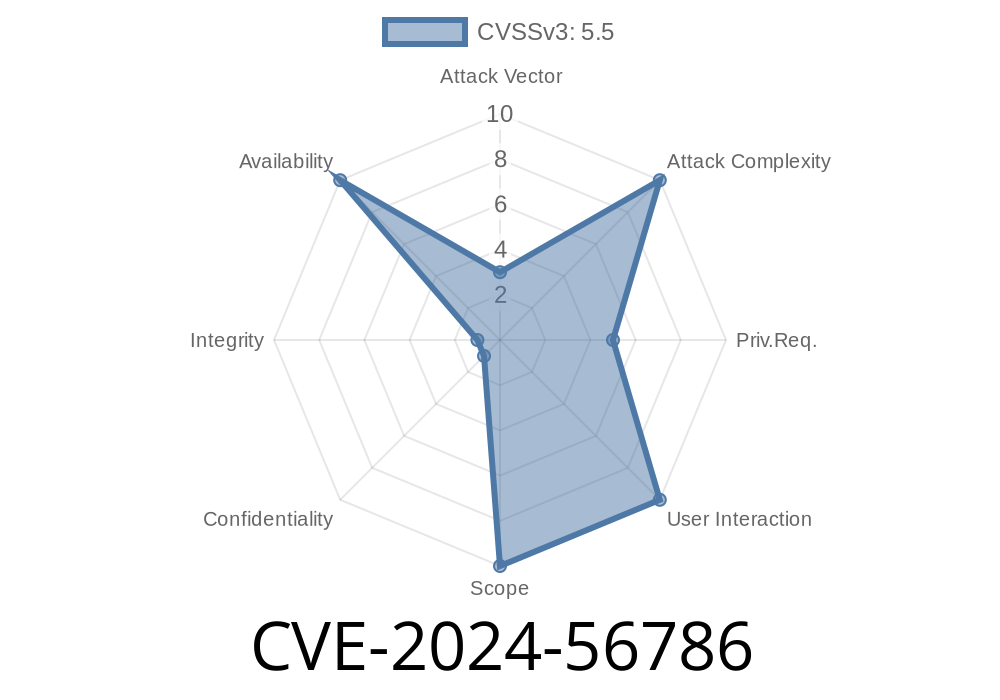A new vulnerability, CVE-2024-56786, has been identified and resolved in the Linux kernel BPF (Berkeley Packet Filter) subsystem. This issue concerns the lifetime management of “BPF link” objects and their attached programs, which could result in a classic use-after-free bug. Use-after-free vulnerabilities are serious, as they may allow attacks such as privilege escalation, information disclosure, or system crashes.
In this long read, we’ll break down how CVE-2024-56786 happens, the changes made in the fix, the exploit risk, and what this means for users and developers. We’ll use simple language to make these kernel-internals accessible.
What Is BPF and What Are Links?
BPF is a technology in Linux that allows for safe, user-programmable code to run inside the kernel. It’s used for firewalls (like bpfilter), observability (like bpftrace), and more.
BPF program: Compiled code to run in the kernel.
- BPF link: A kernel object that represents an attachment between a BPF program and a kernel hook (an event or location where BPF code can be run).
The Problem: Lifetime Management Gone Wrong
Normally, a BPF program should only be released (freed from memory) after there are no more references to it. In the case of BPF links, that means the program should not be freed as long as the link (the attachment) might potentially hold a reference, directly or indirectly.
Remove reference to BPF program as soon as possible (eagerly).
- BPF program release code *waits* for in-flight code (“readers”) using RCU (Read-Copy-Update) to finish.
But: Certain BPF links have more relaxed rules (sleepable semantics) and need extra protection using another RCU flavor, RCU Tasks Trace. If you drop the reference *before* both kinds of grace periods have finished, the BPF program could be freed while still running or referenced, creating a race condition.
Visual
Attach Hook
| \
Link <-. \
| Program
|___________^
If you free the program too soon (before the link is really gone, and before all RCU GPs finish), you risk the pointer in the link becoming invalid—a use-after-free bug.
Technical Details—Code Snippet
The fix is the *timing of releasing (putting) the BPF program reference.* Here’s a simplified version of the code logic before and after the fix:
Before
void bpf_link_release(struct bpf_link *link)
{
bpf_prog_put(link->prog); // put program reference early
call_rcu(&link->rcu, bpf_link_deallocate); // deferred deallocation of link
}
After
void bpf_link_release(struct bpf_link *link)
{
call_rcu(&link->rcu, bpf_link_dealloc); // Only schedules link deallocation
}
// New function: ensures program is only released when safe
void bpf_link_dealloc(struct rcu_head *rcu)
{
struct bpf_link *link = container_of(rcu, struct bpf_link, rcu);
bpf_prog_put(link->prog); // Release program reference now, when safe
kfree(link); // Free the link itself
}
This change defers freeing the program until it is *truly* safe, fixing the window where a use-after-free could occur.
Exploitability: How Attackers Could Leverage This
If not fixed, an attacker with the ability to create and attach/detach BPF links (e.g., with CAP_BPF or privileged access) could:
System instability or crashes.
Attackers would need the ability to load and manipulate BPF programs—a privileged operation by default, but something to monitor for.
Proof-of-Concept (PoC): Vulnerable vs Safe Workflow
Here’s a (pseudo-code) scenario showing the risky sequence. (Not a full exploit, but illustrates the bug window.)
int fd = bpf(BPF_PROG_LOAD, ...); // Load a BPF program
int link_fd = bpf(BPF_LINK_CREATE, fd, ...); // Attach BPF program
// In the kernel, process A triggers link release (bpf_link_release)
// bpf_prog_put(link->prog) is called too soon
// Process B triggers operations that cause program memory to be reallocated
// Kernel code, running in RCU grace period, still tries to use link->prog
// Use-after-free: kernel crashes or executes attacker-controlled data!
*With the fix*, the kernel waits until both the link and program can be safely freed, closing the exploit window.
Patch and References
The vulnerability is fixed by deferring the program release until after all required RCU grace periods (both regular and Tasks Trace) are finished.
Main patch reference
- https://git.kernel.org/pub/scm/linux/kernel/git/torvalds/linux.git/commit/?id=90ab9c3f1bbf
Vulnerability tracker
- CVE Details: CVE-2024-56786 *(to be updated as it is new)*
Relevant kernel mailing list discussion
Who Is Affected?
- Users of mainline and enterprise Linux kernels with BPF features enabled (especially custom BPF hooks).
Systems where untrusted users have BPF capabilities (rare but possible).
If you use BPF extensively or allow dynamic loading of BPF programs, especially by non-root users, this bug is *highly relevant*.
Restrict BPF: Limit who can load BPF programs (sysctl kernel.unprivileged_bpf_disabled=1).
- Audit kernel code: If you work on custom BPF hook/link types, ensure RCU/RCUTT semantics are handled as in this patch.
Conclusion
CVE-2024-56786 is a subtle but serious kernel bug that could have led to use-after-free attacks in the BPF subsystem. Proper *reference counting* and *lifetime management* are critical in kernel programming—especially with complex subsystems like BPF and advanced synchronization (RCU).
This patch shows how the kernel community identifies and fixes deep technical issues to keep Linux robust and secure.
Further Reading
- BPF Documentation
- Linux RCU Explanation
- bpf-next GitHub tree (for bleeding-edge patches)
Stay safe! If you have questions about BPF security or want to learn more, check out the links above or follow the latest Linux kernel security advisories.
*(This article is original content created for educational purposes. Please cite it if distributing.)*
Timeline
Published on: 01/08/2025 18:15:19 UTC
Last modified on: 01/10/2025 18:53:06 UTC
